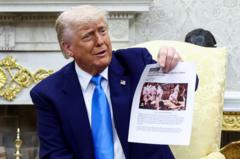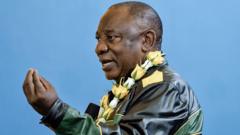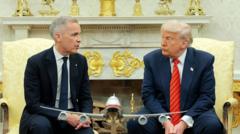**In a stark confrontation, President Trump characterized the plight of white people in South Africa while dismissing broader context, igniting international discourse on race.**
**Trump's Controversial Address on Race at South African Summit**

**Trump's Controversial Address on Race at South African Summit**
**In a meeting with the South African president, Trump sparked debate over race relations by framing his remarks around white grievances.**
In an unexpected and contentious meeting, President Donald Trump met with South African President Cyril Ramaphosa in the Oval Office on Wednesday, where he positioned himself as the defender of white South Africans. During the exchange, Trump repeatedly emphasized claims that white people in South Africa are being violently persecuted, stating that they are "being executed" and constantly referencing “dead white people.”
The context of Trump's comments stirred controversy, particularly given Ramaphosa's leadership in overcoming apartheid, a discriminatory regime that enforced racial segregation in South Africa. While Ramaphosa sought to engage in a cooperative dialogue, articulating the need for civil discourse, he faced Trump's unyielding assertions about the supposed vulnerability of white citizens in a nation with a history deeply marred by racism.
Police data and crime statistics debunk the notion that white South Africans face unique threats, a fact Trump seemed to overlook in his narrative. The former president’s rhetoric reflects a long-standing theme in his political career — portraying himself as the champion of white Americans who feel marginalized in a society increasingly acknowledging historical injustices against Black communities and other minorities.
This stark divergence in perspectives raises pressing questions about race relations in America and globally, exposing the persistent tension between historical narratives and current realities. Trump’s remarks, deeply rooted in a controversial analysis of race, underline a broader trend of polarizing dialogue surrounding ethnicity and national identity at a time when these issues have become critically relevant.
As the conversation unfolded, Ramaphosa invoked the ideals of his predecessor, Nelson Mandela, urging for a civil approach to the complex and sensitive dialogue around race, demonstrating the divide between the leadership and perspectives of the two nations.
The context of Trump's comments stirred controversy, particularly given Ramaphosa's leadership in overcoming apartheid, a discriminatory regime that enforced racial segregation in South Africa. While Ramaphosa sought to engage in a cooperative dialogue, articulating the need for civil discourse, he faced Trump's unyielding assertions about the supposed vulnerability of white citizens in a nation with a history deeply marred by racism.
Police data and crime statistics debunk the notion that white South Africans face unique threats, a fact Trump seemed to overlook in his narrative. The former president’s rhetoric reflects a long-standing theme in his political career — portraying himself as the champion of white Americans who feel marginalized in a society increasingly acknowledging historical injustices against Black communities and other minorities.
This stark divergence in perspectives raises pressing questions about race relations in America and globally, exposing the persistent tension between historical narratives and current realities. Trump’s remarks, deeply rooted in a controversial analysis of race, underline a broader trend of polarizing dialogue surrounding ethnicity and national identity at a time when these issues have become critically relevant.
As the conversation unfolded, Ramaphosa invoked the ideals of his predecessor, Nelson Mandela, urging for a civil approach to the complex and sensitive dialogue around race, demonstrating the divide between the leadership and perspectives of the two nations.





















